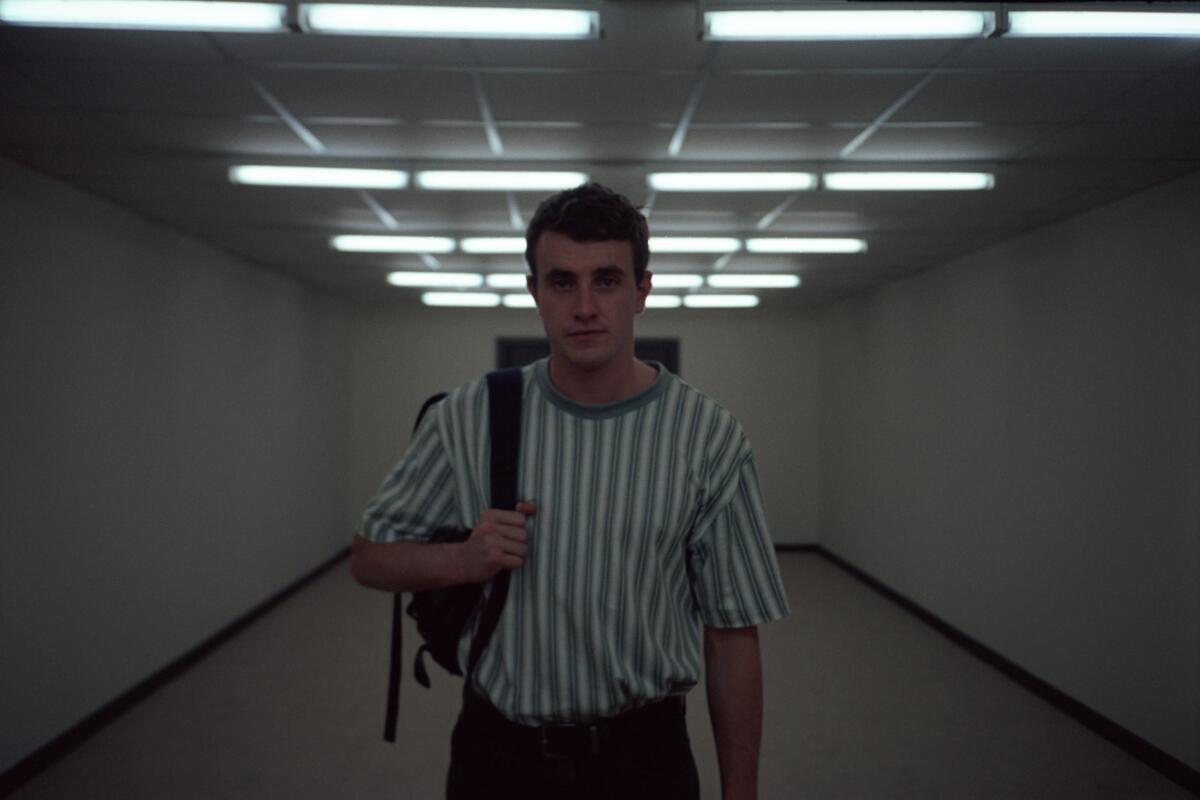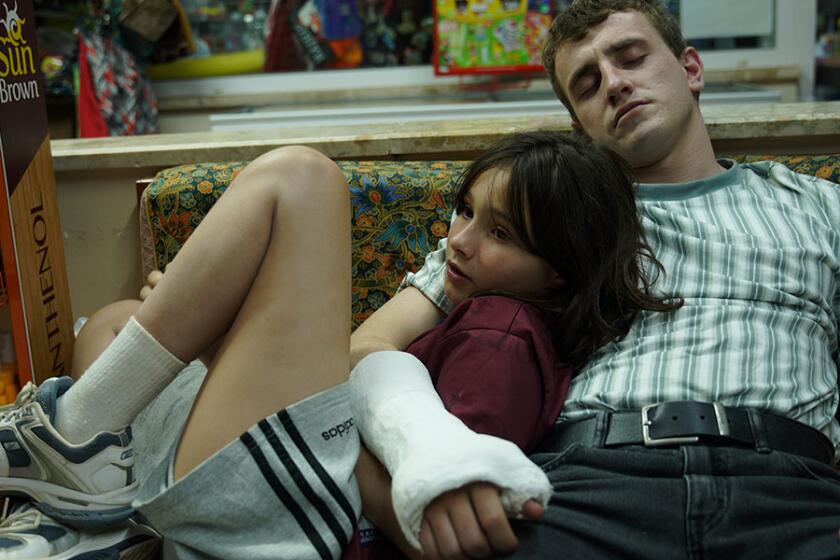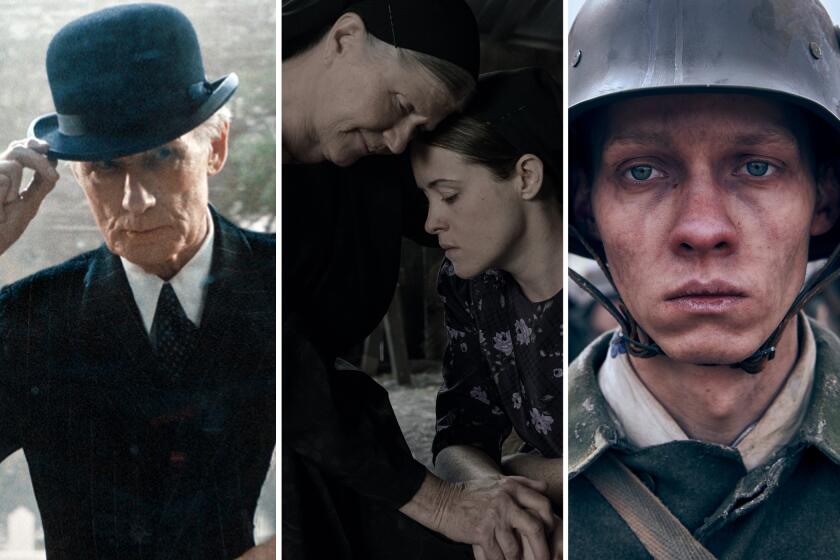Oscar or not, Paul Mescal makes screen acting look natural again

- Share via
Sometimes you don’t know what you’ve been missing until you experience it again. I felt that way watching Paul Mescal’s performance in “Aftersun,” the stunning debut film by writer-director Charlotte Wells.
This highly personal drama, following a divorced young father and his 11-year-old daughter on summer holiday in Turkey, is elliptical in a way that tries to duplicate the staccato rhythms of memory. Wells doesn’t make it easy for an audience to find its footing. She’s stingy with plot, withholding a clear sense of the story’s destination. But her two stars, Mescal and Frankie Corio, are so natural onscreen that I found myself tuning in to the inner lives of their characters and caring about their every meandering vacation move.
This pleasurable absorption was the exception in my recent disenchanting spree of moviegoing. The cinema is having a hard time of late, and I don’t wish to add to the pile of woes. But something seems amiss in American screen acting. Performances I expected to love in films I was sure would draw out the best in their stellar talent left me scratching my head.
Psychological realism is a national specialty. A whole school of American acting, the Method, found its purpose in tense family dramas. I couldn’t wait to lose myself in the domestic turmoil of Steven Spielberg’s “The Fabelmans” and James Gray’s “Armageddon Time” — two high-profile films in which established auteurs look back at formative experiences of their childhoods — but in both cases I was stopped short by the artificiality of the performances.
Naturalism is not the point of these films, but I’m hard-pressed to tell you what effect the directors hoped to elicit from their actors other than distortion and confusion.
Normally, I’m hypnotized by Michelle Williams’ anguished authenticity, but I spent nearly the entirety of “The Fabelmans” trying to figure out why she was talking like a semi-sedated Judy Garland. Spielberg would of course be the best judge of the accuracy of Williams’ portrayal of Mitzi Fabelman, a character based on his mother. But I ultimately chalked up the fluttery stylization to a miscast actor’s bold attempt at self-rescue.
Gabriel LaBelle, as Sammy Fabelman, Spielberg’s young surrogate, was outstanding in revealing the seismic subterranean shifts in a precocious adolescent’s awareness of flaws in the adult world. But Paul Dano as Burt Fabelman is so sunk in his character’s subtext that he forgets to play a plausible father. Rather than speak his lines, he emotionally annotates them, like a therapist with more sensitive ideas than life experience.
Everyone seems to be acting in their own universe, including Judd Hirsch, whose scenery-chewing appearance as Uncle Boris threatens to break through the screen and grab the audience by the scruff of the neck. From all reports, he’s a shoo-in for an Oscar nomination. It would not in the least surprise me if he were also on the shortlist for a Razzie.
I had to assume that Anne Hathaway and Jeremy Strong, the parents in “Armageddon Time,” were cast to bring attention to Gray’s autobiographical film. It’s a tough racket for movies without superheroes or recognizable stars. But it’s disheartening to see gifted performers flail in films that can’t figure out what to do with them except promote them for awards.
Serious actors who feel thwarted by the impossible economics of the big screen have had no choice but to turn to television to exercise their craft at a high level. HBO and its streaming rivals are now the premier showcase for adult drama.
That’s where I first encountered Mescal. His performance in “Normal People,” the TV miniseries version of Sally Rooney’s novel that I watched avidly on Hulu, captivated audiences with its rumbling lyricism and meditative grace.
Since then the Irish actor, a 2017 graduate of the Lir National Academy of Dramatic Art in Dublin, has been hotly in demand. At the start of the year, it was announced that not only would he be starring in Ridley Scott’s “Gladiator” sequel but that he would also be taking over the pivotal role of Broadway composer Franklin Shepard in Richard Linklater’s version of Stephen Sondheim and George Furth’s “Merrily We Roll Along,” a decades-long undertaking that makes clear that Mescal is more than an action hero hunk.
He’s currently playing Stanley in London in the Almeida Theatre Company revival of Tennessee Williams’ “A Streetcar Named Desire.” Matt Wolf in the New York Times enthusiastically observed, “Mescal brings both swagger and sensitivity to the role, in the process stepping out of the long shadow cast over this part by its stage and screen originator, Marlon Brando.”
“Aftersun” is probably too small a film to garner much Academy Award notice, but no one who sees Mescal‘s performance in it will forget it. At least no one with an interest in seeing how acting can transcend this mirror-gazing age of ubiquitous social media.
Actor Paul Mescal and director Charlotte Wells create emotional power even within the vagueness of reality in the film inspired by Wells’ life.
Is it even possible to exist, never mind act, in an unself-conscious manner anymore? The cameras are always on, even when we’re alone with ourselves. Mescal’s performance answers unequivocally that it is indeed possible.
The film is set at a time when phone booths are still extant, but this is not a screen-free zone. The father-daughter vacation is being preserved for posterity on video. We experience Calum (Mescal) and Sophie (Corio) through Wells’ lens and their own — the two visual strands forming a double helix. What’s remarkable is that the actors are so deeply ensconced in their roles that it makes no difference who’s ostensibly behind the camera. The reality of the characters puts the audience in the position of spies.
The plot, if you can call it a plot, is intuitive. Calum wants Sophie to retain happy memories of their time together. He’s trying to compensate perhaps for his past absences and hopes to give her something loving to remember when he’s gone for good.
Calum and Sophie are mistaken for siblings. He’s incredulous that he made it to 30 and doubts that he’ll ever reach 40. The film flashes ahead to Sophie as an adult, a new mother in a lesbian relationship, somberly sifting through video of her long-ago trip. She has the expensive carpet next to her bed that Calum bought in Turkey despite not being able to afford it — an heirloom now of her father, implicitly dead, with questions about his life likely never to be answered. (Wells, whose own father died when she was 16, has described “Aftersun” as “emotionally autobiographical.”)
Against a backdrop of future grief, Wells keeps the focus tightly on the living. She nonjudgmentally observes Calum and Sophie as they spend a week together, lying by the pool, goofing off in their room, coping with karaoke, shooting pool, making small talk with fellow vacationers.
“Aftersun” is subliminally attentive to Sophie’s maturation from child to adolescent. The father-daughter closeness has moments of awkwardness. Calum is upset that their room doesn’t have separate beds as requested. Sophie would rather apply suntan lotion to her own back. These details aren’t coerced into a ready narrative but are allowed to linger quietly. Meaning is a retrospective pursuit, and Sophie has a lifetime of it before her.
“Never work with children or animals.” This old showbiz witticism from W.C. Fields might seem applicable to the effortlessly natural Corio. How could any adult actor keep up?
But Mescal miraculously holds his own. What impresses me most about his work in “Aftersun” is his refusal to explain his character. He leaves no ponderous hints of what’s in store for Calum. Instead, he gives himself over to his director’s vision, which is not to definitively interpret memory but to rekindle it so that what is lost can be brought back to life.
There is a scene of Calum crying unconsolably, but the timing is uncertain. The image flickers onscreen before vanishing, resonating with our intuition but not confirming anything. Mescal doesn’t spell out the whys and wherefores of his character’s pain. What he does is allow us to feel the love of a rudderless father who wants badly to give his daughter what she deserves and what he knows himself unable to provide.
The ‘Normal People’ heartthrob, co-star Frankie Corio and director Charlotte Wells on the relationship between their film ‘Aftersun’ and real life.
Mescal never makes “Aftersun” about his brilliance. He subordinates himself to the work — and by doing so is elevated by it.
What a refreshing break from the usual Oscar-bait! I’m weary of watching prestige actors transform themselves physically, like Brendan Fraser in “The Whale,” or flaunt their theatrical daring, like Cate Blanchett in “Tár,” which lost me as soon as her character pulled out an accordion in the film’s unsteady latter stretch. I admired these performances, don’t get me wrong. But I was keenly aware that I was watching elite actors going for the gold.
When I venture to a movie theater — a diminishing activity, I must admit — I sometimes just want to experience what it’s like to be human for someone else. Realism, one pathway to this end, must be continually reinvented. What looks natural to one era seems fake to the next. Mescal in “Aftersun” updates our sense of what it is to inhabit a life — to dwell in the eternal yet historically coded mystery of being alive.
Our BuzzMeter film experts predict the Oscar winners in 10 categories. Check out the consensus picks, close races and interesting narratives - and vote in the polls for every category.
More to Read
The biggest entertainment stories
Get our big stories about Hollywood, film, television, music, arts, culture and more right in your inbox as soon as they publish.
You may occasionally receive promotional content from the Los Angeles Times.














